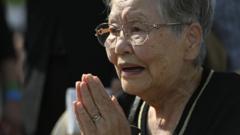On the 80th anniversary of the atomic bombing, Hiroshima reflects on its past while calling for a future free of nuclear weapons.
Hiroshima Commemorates 80 Years of Resilience and Reflection

Hiroshima Commemorates 80 Years of Resilience and Reflection
As the world remembers the tragedy of Hiroshima, survivors and officials urge for nuclear disarmament and lasting peace.
Hiroshima, Japan, found a somber yet unyielding spirit as it commemorated 80 years since the US dropped the atomic bomb on the city, a decisive moment that marked the end of World War Two. On Wednesday, a silent prayer echoed through Hiroshima's Peace Memorial Park, attended by Japanese Prime Minister Shigeru Ishiba and international dignitaries, with each participant remembering not just the event's horror but the hope for perpetual peace.
Hiroshima's mayor, Kazumi Matsui, stood at the forefront of this reflection as he addressed the assembled crowd, noting, "Japan is the only nation that has suffered an atomic bombing in war." His words resonated deeply, encapsulating the ongoing struggle for a world free of nuclear conflict. The catastrophic consequences of the bombings, which claimed more than 200,000 lives — through both immediate effects and long-term radiation sickness — still linger in the memories of those affected today.
Among those voicing heartbreaking experiences is Shingo Naito, a survivor whose childhood was forever altered by the blast. Both he and other survivors have been engaged in initiatives to convey their painful stories to younger generations, with students transforming their accounts into creative art as a means of remembrance.
The 2024 Nobel Peace Prize recipient, Nihon Hidankyo, a group advocating for the rights of atomic bomb survivors, underscores Japan's yearning for global disarmament in light of increasing militarization and the rising acceptance of nuclear deterrence.
Mayor Matsui expressed grave concerns regarding the global arms race and the declining effectiveness of nuclear prohibitions. He called on the Japanese government to sign the Treaty on the Prohibition of Nuclear Weapons, a landmark agreement establishing a legal ban on nuclear arsenal, which became effective in 2021. Even at this poignant time, protests arguing for nuclear abolition were held nearby, indicating a divergence in public sentiment about Japan's security strategy.
Survivors like Saitoshi Tanaka drew parallels between today's conflicts in Gaza and Ukraine, invoking their trauma from the past. "We are living alongside nuclear weapons that could wipe out humanity multiple times over," he remarked, emphasizing a collective responsibility to demand action from nuclear-armed nations.
As commemoration of the tragedy concludes, Hiroshima's call for peace reverberates around the globe, compelling everyone to remember the past while nurturing hopes for a safer future.



















